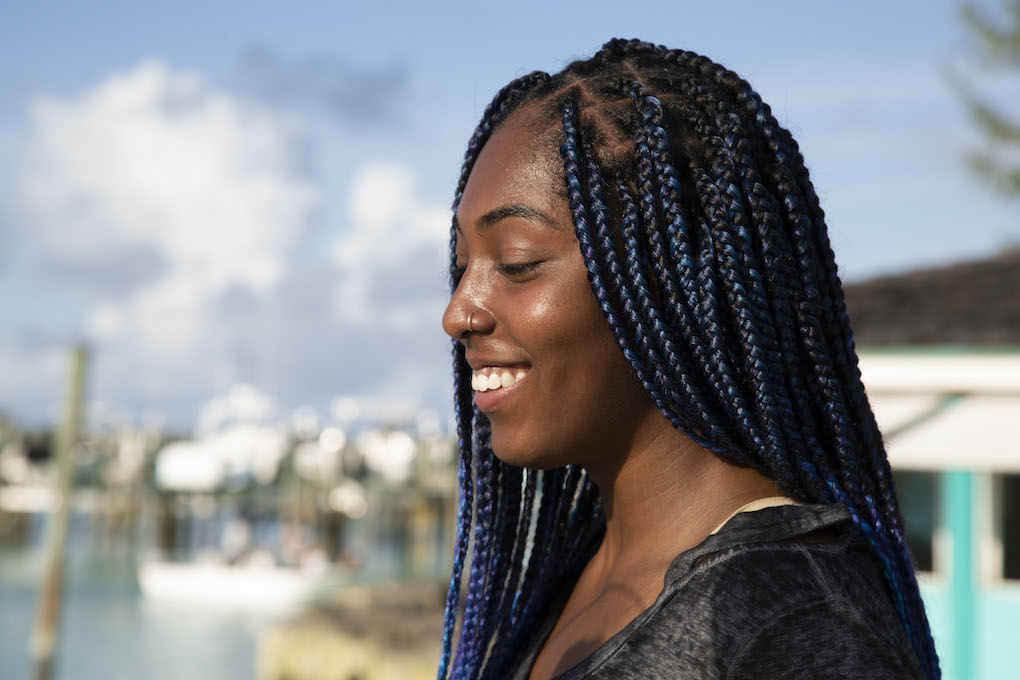Meet Carlee Jackson, one of the young, brilliant minds doing big things for our oceans and the animals that live there.
With the unmistakable shift in our environment in recent years, this shark conservationist has her work cut out for her. And considering that less than 3% of marine biologists are Black, according to career site Zippia, it puts a different spin on how much this work is needed — in more ways than one.
In the continued celebration of National Geographic’s TV event of the summer SharkFest, we’re highlighting the people in our community who are making major waves and creating big changes in the world.
More Than Just a Job
The Detroit native got her start at a young age, citing an interest in marine life for as long as she could remember. While studying at Nova Southeastern University, Jackson’s master’s thesis project took her to Belize for two months. There, she led a study on the effects of feeding tourism on the native nurse shark. “I think it’s one of the things that I’m most proud of,” she says. “It was a study that I led and developed from scratch.” Since then, her passion has become more than just a job.
Currently, Jackson works as a Sea Turtle Research Associate with New College of Florida, currently based at Disney working with their team of conservationists. Her typical research and conservation activities include anything from sea turtle nesting surveys on the beach to conducting behavioral research logging the bio data back in the office.
It’s About the Shark Hype
While Jackson speaks lovingly of her work with sea turtles, it’s when #sharks enter the chat that her eyes really light up. “I can nerd out talking about sharks all day,” she laughs.
During her study, she grew an even deeper affinity for the nurse shark, which she describes as a “mellow and gentle creature.” However, after studying their behavior during their interaction with tourists, she noticed that their disposition changed completely, becoming much more unstable.
Jackson knew human activity had a direct impact on the species — and the lives of many other species of sharks. This is significant because, in the coming years, efforts to conserve the earth and its environment will take on a new meaning.
And while many of us might wonder why we should give extra attention to a species that’s gotten some pretty bad press, the truth is that humans have a lot more in common with sharks than we think.
“Sharks are a ‘long live species,’” Jackson explains. “That means, they grow and develop over years, not months.” They form social attachments and grow and develop slowly, just like humans.
They’re also just as sensitive to changes in their environment. Things like climate change and overfishing — not to mention manmade materials getting into their environment — disrupt their food supply and cause long-term damage. “They don’t just recover,” Jackson explains. “It takes a generation for them to find their equilibrium again.”
From factors like pollution and overfishing, as well as irresponsible, deadly fishing practices that lead to the accidental capturing of sharks, conservation efforts still have a big job ahead of them.
Making Way for Minorities in Marine Science
It’s a huge job, but Jackson is up to the task and working to create opportunities for other people of color and break down barriers in the process.
“I noticed that Black people in this field have been historically excluded,” she says. Many minorities looking to get into the sciences find extra difficulties when trying to carve their career path. Financial barriers, as well as issues of access, have long been a force to contend with — and that’s before even breaking through the door. Once these professionals make it, the exclusion often continues.
The road hasn’t always been an easy one for Jackson either. “Too often, you get underestimated or not taken seriously,” she says. “You wonder if you’re going to fit in here.” She admits that the field still has a lot of work to do to improve on efforts around inclusion. Since she began, Jackson has developed a thick skin so she can continue to get to work because it is important.
Even though many people of color face those barriers, it doesn’t mean breaking them down is impossible. And the world of marine conservation definitely needs all the best minds to take it on.
Jackson’s experience has led her to co-found the organization, Minorities in Shark Sciences (MISS), a space for minority women in marine sciences — particularly shark science. It started as a place for people of color working in shark sciences to connect and share resources, then grew into a larger effort to reach even more people of color in nature sciences. Its aim is to fuel innovation by creating space for women of color in the shark sciences.
It’s a big job, but by combating the historical exclusion of Black women in the marine sciences, Jackson and her co-founders have big plans to create better futures and a better world.
Her advice to other young Black women looking to get into marine sciences? “Just go for it. You deserve to be here!”
Learn more about the sharks and the brilliant people working with them on SharkFest. You can catch it all summer long on National Geographic or on Disney+.
This editorial is brought to you in partnership with National Geographic.
